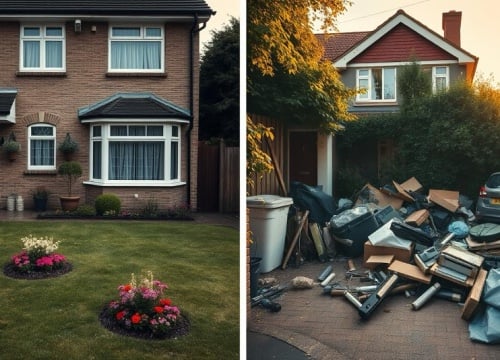When it comes to moving or preparing a property for sale, the need for house clearance or relocation services is something homeowners and real estate professionals face on both sides of the Atlantic. However, there are significant differences in how these services are handled in the United States and the United Kingdom. Whether you’re planning a transatlantic move or are simply curious about how home transitions differ between these two markets, understanding these nuances can help you make informed decisions—and potentially save time, money, and stress.
In this article, we’ll explore the key differences between U.S. and UK practices related to house clearance, moving services, and real estate preparations, with a special focus on the growing demand for eco-conscious disposal and professional clearance operations.

Understanding House Clearance
In the UK, house clearance refers specifically to the process of removing all items from a property—furniture, personal belongings, appliances, rubbish, and sometimes even fixtures. It is typically needed in situations such as:
- Selling or letting a property
- Managing a deceased estate
- Downsizing or relocating to a care home
- Handling hoarded or abandoned properties
By contrast, in the U.S., the term “house clearance” is not widely used. Instead, Americans typically refer to “junk removal,” “estate cleanouts,” or “property cleanouts.” While the end result is similar—clearing out the contents of a home—the processes, regulations, and expectations differ significantly.
House Clearance and Property Sales: UK vs. U.S.
United Kingdom
In the UK, it’s standard for sellers to vacate a property completely before handing it over to new buyers or renters. Any remaining furniture or belongings must be removed, and many estate agents will recommend a full house clearance as part of the sales preparation process. In fact, showing a property as a “blank canvas” is considered essential for attracting serious buyers.
Professional house clearance companies in the UK often provide:
- Inventory and valuation of items
- Responsible disposal (recycling, charity donations, landfill as a last resort)
- Cleaning services post-clearance
- Coordination with solicitors or estate agents
One of the standout aspects of house clearance London services is the focus on sustainability and re-use. Many clearance firms aim to recycle or donate as much as possible, aligning with stricter UK waste regulations and public concern over landfill use.
United States
In the U.S., it’s more common for homes to be sold with furnishings or “as-is,” especially in estate sales or foreclosure situations. Buyers may inherit the responsibility of removing unwanted items themselves or through a junk removal company.
Estate sales are also a more prevalent practice in the U.S., where the contents of a home are sold off over a weekend, typically before the final property cleanout. This differs from the UK, where estate sales are less common and handled more privately or through auction houses.
Moreover, while U.S. moving companies often assist with packing and transportation, they usually don’t provide full-service clearances. Americans must often coordinate multiple vendors—one for junk removal, one for moving, and possibly another for cleaning—whereas UK house clearance services tend to offer a one-stop solution.
Moving Services: Cultural and Logistical Contrasts
Both countries have robust moving industries, but again, the approach and scale can differ.Moving in the UK
UK residents typically deal with smaller properties, narrower roads, and parking restrictions, especially in cities like London. This makes moving a highly logistical affair, often requiring detailed access planning and smaller vehicles. Professional movers may also need to navigate complex tenancy agreements, homeowner association rules, and local council regulations.
The cost of moving in the UK is generally calculated by volume (cubic feet or meters), and many firms offer additional services like temporary storage and packing.
Moving in the U.S.
U.S. moves, particularly across states, are often far larger in scale. With more spacious properties, larger moving trucks, and greater distances involved, long-haul moving is a major business. The U.S. also has a high rate of job-related relocations, often funded by employers and managed by relocation specialists.
Pricing is commonly based on weight and distance, and services range from basic truck rental to full white-glove moving, where every item is packed, transported, and unpacked by professionals.
Regulation and Waste Disposal
The UK has strict regulations about waste disposal and recycling, particularly for commercial services like house clearance. Firms must hold a waste carrier’s license, and they face penalties for improper disposal. This has encouraged the growth of eco-conscious house clearance businesses that sort items for charity, reuse, or recycling.
In contrast, while U.S. states have varying environmental regulations, junk removal companies are often less regulated overall, and more dependent on landfill disposal. However, many firms—particularly in urban areas—are moving toward greener practices due to consumer demand.
What U.S. Residents Can Learn from UK House Clearance
For Americans looking to streamline their home sale or downsize more sustainably, there are a few lessons to take from the UK market:
- Consolidated Services – UK companies offer all-in-one solutions: clearance, donation, recycling, cleaning, and sometimes even property staging.
- Sustainable Disposal – Emphasizing reuse and recycling helps reduce environmental impact and supports local charities.
- Professional Valuation – Many UK clearance companies offer item assessments, which can identify valuable antiques or collectibles worth selling separately.
If you’re in the U.S. but looking to adopt a more organized and eco-friendly approach, you may want to explore services that resemble the house clearance London model.
Final Thoughts
While both the U.S. and UK provide effective moving and property preparation services, the UK’s approach to house clearance offers an efficient, environmentally responsible model worth considering. Especially in cities like London, where space is limited and sustainability is a priority, streamlined clearance solutions provide practical and ethical ways to prepare a home for its next chapter.
Whether you’re in New York or Newcastle, preparing a property for sale or relocation is a major undertaking. But by understanding the differences between U.S. and UK practices, you can make smarter choices—and maybe even turn a cluttered space into a clean slate.
We hope you found this blog post on House Clearance in the UK vs. the U.S.: Key Differences When Moving or Selling a Property, useful. Be sure to check out our post on Move All Your Belonging Safely Overseas for more great tips!
Have Experience in the Moving Industry? Want an Additional Income Stream? Work With All Around Moving!
Join our team today, moving consultants! All Around Moving shares profits 50-50% with you from all jobs you book with us. There are no recurring expenses, except purchasing your own leads. Click here to learn more.





